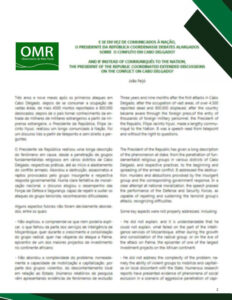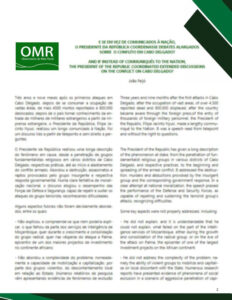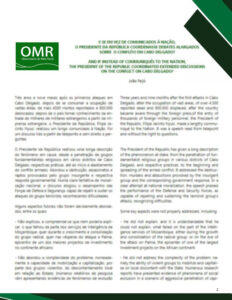Autor: João Feijó
Ao longo do último ano, a intervenção militar de tropas ruandesas aumentou a segurança em Palma e Mocímboa da Praia, movendo a acção dos grupos rebeldes para Sul e Noroeste da província. Verifica-se o regresso de dezenas de milhares de indivíduos àquelas vilas sede distritais, traduzindo o retorno de alguma normalidade, condição imposta pela empresa Total para inverter a sua declaração de force majeur. Este texto demonstra que o regresso das populações é motivado por factores de repulsa existentes nos centros de reassentamento, marcado pela irregularidade na distribuição de ajuda alimentar e por dificuldades de acesso a meios de produção, conjugado por notícias de maior segurança nos locais de origem. O regresso das populações verifica-se num cenário de descapitalização das famílias e escassez de alimentos, assim como de ausência generalizada de infra-estruturas e serviços públicos. Continuam por se verificar alterações significativas na economia política da região, pelo que a relativa segurança militar que se experiência não oferece garantias de longa duração. O texto apresenta um conjunto de propostas de reformas políticas e económicas, que promovam uma maior integração económica do território, a inclusão e reconhecimento sociopolítico das populações, e estabilização do território.
Over the past year, the military intervention of Rwandan troops has increased security in Palma and Mocímboa da Praia, moving the action of rebel groups to the south and northwest of the province. There is the return of tens of thousands of individuals to those villages district headquarters, following the return of some normality, a condition imposed by the company Total to reverse its declaration of force majeure. This text demonstrates that the return of the populations is motivated by factors of revulsion existing in the resettlement centers, marked by irregularity in the distribution of food aid and difficulties in accessing means of production, combined with news of greater security in the places of origin. The return of the population takes place in a scenario of decapitalization of families and of food shortages, as well as the widespread absence of public infrastructure and services. Significant changes in the region’s political economy are yet to occur, so the relative military security that is underway does not offer long-term guarantees. The paper presents a set of proposals for political and economic reforms, which promote greater economic integration of the territory, the inclusion and socio-political recognition of the populations, and stabilization of the territory.
Novembro de 2022








